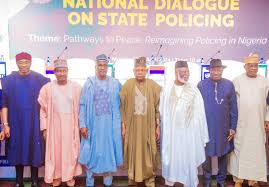
Vice President Kashim Shettima; former President Goodluck Jonathan and elder statesman Abdulsalami Abubakar are among dignitaries attending a dialogue on state police.
The dialogue is the beginning of deliberations on the Constitution of the Federal Republic of Nigeria (alteration) bill 2023 (Establishment of State Police) sponsored by the Deputy Speaker of the House of Representatives, Benjamin Kalu and 13 others.
Abdulsalami Abubakar and Goodluck Jonathan
Former military Head of State, Gen Abdulsalami Abubakar (retd.), former President, Goodluck Jonathan and retired Catholic Archbishop, John Onaiyekan were among the important personalities gathered in Abuja on Monday, April 22, for a national dialogue on state policing.
Organised by the Office of the Speaker of the House of Representatives, the dialogue is the beginning of deliberations on the Constitution of the Federal Republic of Nigeria (alteration) bill 2023 (Establishment of State Police) sponsored by the Deputy Speaker of the House of Representatives, Benjamin Kalu and 13 others.
The bill is designed to improve public safety and strengthen law enforcement in Nigeria by decentralising the police. The proposal in the bill provides for state police alongside the federal police and outlines a constitutional framework for states that choose to establish and maintain their service.
The police chief represented by AIG Ben Okolo cited abuse by those who want to score political points. He argued that some governors may likely use state police against perceived opponents, leading to rights abuses.
He also told the gathering that state police would lead to multiple structures in states.
Apart from abuse, he also fears that many states lack the funds to bankroll state police.
But Jonathan who admitted fears of abuse, argued that Nigeria needs state police. The former president said it is “non-negotiable” and believes such will tackle security issues in the country such as kidnapping which he says has now become “commercial”.
.png)








 English (US)
English (US)